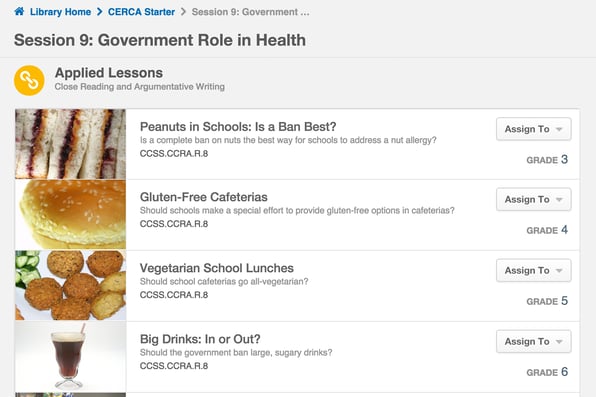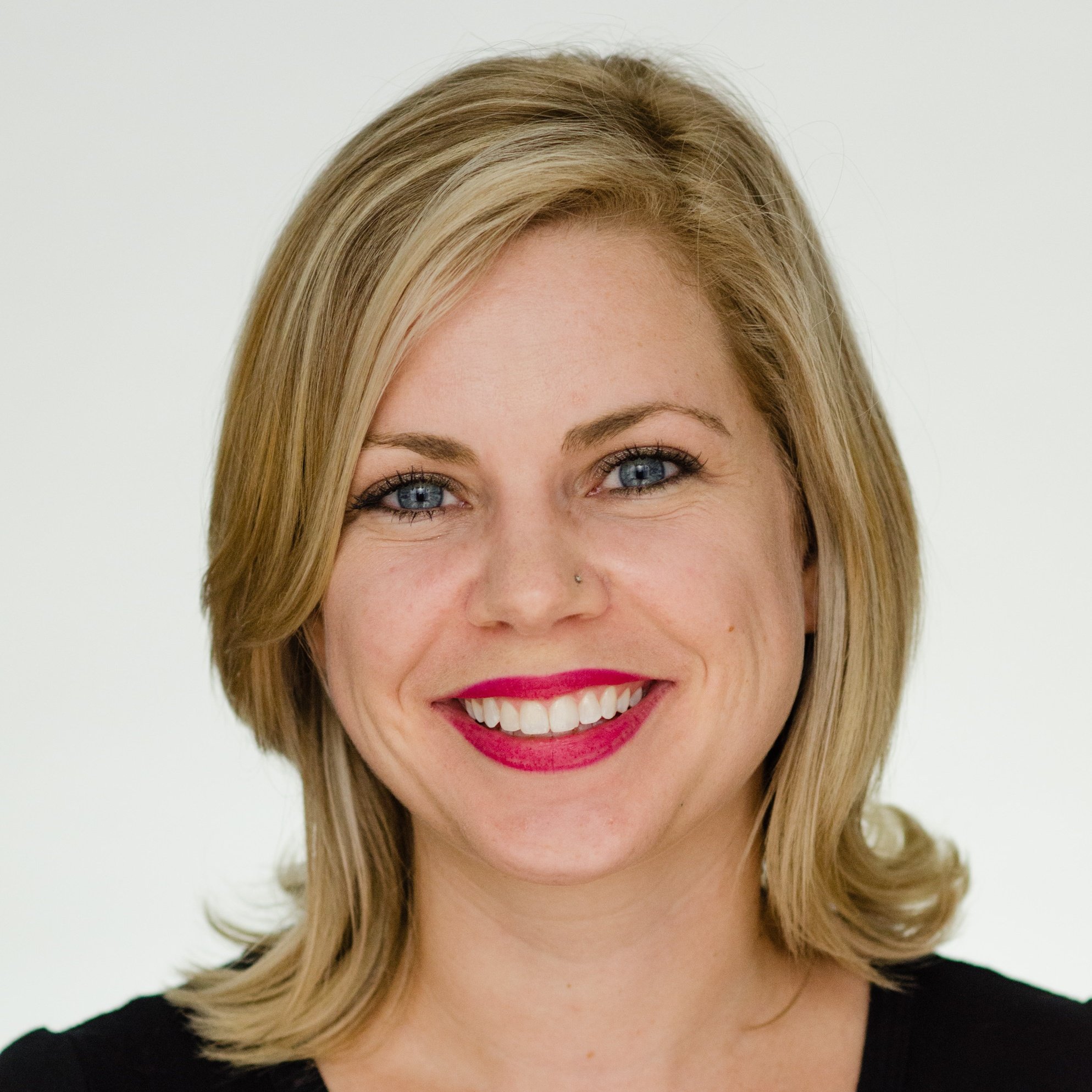
Gather Baseline Writing Measures with CERCA Starter's New Writing Assessment
Since launching CERCA Starter, our free leveling assessment that introduces students to the fundamentals of critical thinking, we're excited to report that students all across the nation have answered more than half a million CERCA Starter questions. With every question answered, teachers are gathering valuable insights into their students' literacy levels. And this translates to a more personalized experience for students moving forward. Over the weekend, Team ThinkCERCA launched another valuable component to the CERCA Starter toolkit: our free argumentative writing assessment. Once students have completed all eight CERCA Starter sessions that introduce them to the basics of argumentation—from why we make arguments to understanding what makes evidence credible—teachers can assign a differentiated applied writing assignment that asks students to make an argument about the government's role in health.
Here's a first person account from Katie Winstead, a special education teacher at Elk Grove High School, about her experience with CERCA Starter and its ability to bolster students' argumentative writing skills in as little as two weeks. As Katie outlines on her school's blog, she used the applied writing lesson Learning at Its Best (instead of Government Role in Health) as pre- and post-CERCA Starter writing assessment. Although not required, this tactic helped her track just how much of an impact these sessions had on her students' writing skills:
Our class did a pre-assessment writing about the following prompt:
What type of learner are you? Use evidence from the text to support your claim about why this learning style is best for you.
After reading an article, I asked the students to write a paragraph-long argument. This is what I got from one student after prompting her to go back and look in the article for examples, etc:
I'm a visual learner. I agree with those things about how I like to read.
We spent about two weeks going over the process of ThinkCERCA and how we can build strong arguments. We spent a day on claims: we looked at claims, analyzed claims, wrote claims and then looked at each other's claims. After going through each part, I had them go back to the original prompt.
This is what I got after two weeks of using [CERCA Starter]:
I learn best by visualizing my school work because if I see examples on what I have to do I get it right away by examples and visuals. The article states "if your a visual learner, you take in informations best by reading." In school I learned vocabulary words by studying. The article also states a true fact, "you get impatient when listening to someone giving an explanation. You just want to read it yourself." When my teachers use to help me with work and they explain it in a difficult way when I can't understand, I want to try and learn it myself. The author says, "kinetic learners might enjoy measuring and mixing." It doesn't apply me because I don't understand how to do it. In conclusion, I am a visual learner.
If you're not sure what reading levels your students should be at, we suggest starting them at grade level. As you start to gather baseline measures back from your students, you can adjust reading levels accordingly directly within the CERCA Starter Report under your Insight dashboard. You can also learn more about understanding CERCA Starter reports here.
Free CERCA Starter Argumentative Writing Assessments
Grade 3: Peanuts in Schools: Is a Ban Best?
Is a complete ban on nuts the best way for schools to address a nut allergy?
(CCSS.RI.3.8; CCSS.W.3.1)
Grade 4: Gluten-Free Cafeterias
Should schools make a special effort to provide gluten-free options in cafeterias?
(CCSS.RI.4.8; CCSS.W.4.1)
Grade 5: Vegetarian School Lunches
Should school cafeterias go all-vegetarian?
(CCSS.RI.5.8; CCSS.W.5.1)
Grade 6: Big Drinks: In or Out?
Should the government ban large, sugary drinks?
(CCSS.RI.6.8; CCSS.W.6.1)
Grade 7: Should Junk Food Be Banned in Schools?
Would banning junk food in schools teach kids how to make healthy eating choices?
(CCSS.RI.7.8; CCSS.W.7.1)
Grade 8: NYC’s Trans Fat Ban Worked: Fast-Food Diners Are Eating Healthier
Should local governments pass laws focused on nutrition—like bans on artificial trans fats in restaurants—to keep their residents healthy?
(CCSS.RI.8.8; CCSS.W.8.1)
Grade 9: FDA-Required Calorie Counts for Fast Food Restaurants Will Not Curb the Obesity Epidemic
Should the FDA require fast-food restaurants to display calorie counts?
(CCSS.RI.9-10.8; CCSS.W.9-10.1)
Grade 10: How Regulation Really Does Change Eating Behavior
Are the benefits of government regulation of unhealthy food worth the price individuals and companies pay in terms of freedom of choice and freedom of speech?
(CCSS.RI.9-10.8; CCSS.W.9-10.1)
Grade 11: Drop and Give Uncle Sam 20
Should our government become more or less involved in public health?
(CCSS.RI.11-12.8; CCSS.W.11-12.1)
Grade 12: What Role Should Government Play in Combating Obesity?
Are government regulations such as New York’s soda ban the best way to combat obesity in the United States?
(CCSS.RI.11-12.8; CCSS.W.11-12.1)
Ready to get your students started? Sign up for a free ThinkCERCA account to access CERCA Starter >>

Elizabeth Riley Boyer is an experienced journalist, digital content strategist, and operations manager. Prior to joining ThinkCERCA, she was part of the founding team at Impact Engine, Chicago’s first social impact investment fund and accelerator. As Impact Engine’s Director of Operations & Communications, Elizabeth oversaw the company’s overall processes, day-to-day planning and finances, curriculum development, marketing strategy, and community outreach.
Elizabeth also spent three years at Chicago magazine, most recently as its Digital Engagement Editor, where she managed the organization’s social media and reader engagement initiatives. Elizabeth also works as a freelance content strategist, writer, and communications consultant. Her recent writings on impact entrepreneurship have been featured by the Huffington Post and Crain’s Chicago Business.
In 2007, Elizabeth helped open a private school for underprivileged children while volunteering for a nonprofit organization in the Dominican Republic. This experience inspired her to quit a paper-pushing job at an insurance brokerage firm to pursue a master’s degree in journalism from Northwestern University. Elizabeth also holds a bachelor’s degree in American studies from the University of Texas at Austin.
